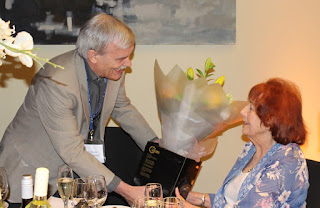Writing can be hard work, especially when ideas and words don't flow as one would wish, but it's richly rewarding work, which offers a great deal of solace when times aren't easy. For me, and I suspect for many others, writing and reading really have been lifelines in 2020. I'm especially grateful to my readers, many of whom have taken the trouble to get in touch during the past year. And despite everything, the past twelve months have in so many ways been the best of my writing career. Topping all else, naturally, was the award of the CWA Diamond Dagger, presented virtually by Ann Cleeves during an online ceremony. The above photo from the 2017 Daggers dinner, when I presented the award to Ann, is still as close as I've got to handling the actual diamond-encrusted and very valuable award, but I have received my personal dagger!
There will be more to say in weeks to come about what I've been working on this year. On the publishing front, it was a year of non-stop activity, with a strong Golden Age focus to many of my projects. I brought out five new books, led by Mortmain Hall. This is a novel that I'm especially proud of, and the reviews in Britain and the US were fantastic. One of the quotes I love is from A.N. Wilson - 'A whole page would not give me space to explain the intricacy of this story. A tangle of satisfying clues and a pleasing denouement in the classic Christie manner.' I was also thrilled to see the book featuring in 'best of the year' lists, notably on CrimeReads and from Ragnar Jonasson. It's truly rewarding to see experts who really know the Golden Age inside out, like Ragnar, Xavier Lechard, and Jose Ignacio Escribano, appreciating the book. The artwork by Ed Bettison for the UK edition attracted a lot of attention and as a result Ed was commissioned by the lovely people at Head of Zeus to produce a new cover in the same style for a welcome reprint of the paperback edition of Gallows Court:
I put together Vintage Crime on behalf of the Crime Writers' Association. Published by Flame Tree Press, this anthology is another beautifully produced book. The stories included chart the evolution of short crime fiction since the CWA was formed nearly seventy years ago, with contributors ranging from Julian Symons to two fine writers of today, Frances Fyfield and Mick Herron.
Throughout this testing year, the British Library team somehow managed to continue with their programme of publishing one Crime Classic a month and I contributed introductions to each of them. In particular, there were two more anthologies which I compiled. I have a soft spot for Settling Scores: each story is by a different author and features a different outdoor sport - as far as I know, that's not been done before.
Almost all these books were actually written last year, but the final compilation of 2020 was somehow rushed through during the pandemic in order to meet the deadline for the Christmas books market. It's my fourth collection of short seasonal mysteries for the British Library, A Surprise for Christmas. The title story was written by one of my favourite authors of the past, Cyril Hare.
Among the foreign editions of my books, I was particularly delighted by the Chinese translation of The Golden Age of Murder. The publishers were even kind enough to make stamps of my autograph and myself to include in copies, given my inability to attend a book launch! During the year I've enjoyed keeping in touch with a number of people I got to know in China last year, and hope I can get back there before too long.
I contributed an essay on 'Plotting' to The Routledge Companion to Crime Fiction, a book I shall be discussing in more detail in the new year. On the true crime front , there was an essay, 'The First of Criminals', about Harold Shipman, for an anthology edited by Mitzi Szereto. There were also articles for a range of online and print magazines, including CrimeReads, CADS, and NB magazine, plus appreciations in a biography of H.R.F. Keating and Joseph Goodrich's very interesting Unusual Suspects.
As regards short stories, I wrote 'The Observance of Trifles', a jokey short story in the form of a blog post plus comments for In League with Sherlock Holmes, edited by Les Klinger and Laurie King; I am looking forward to receiving my copy and reading the stories by fellow contributors such as Tess Geritsen. I wrote a Golden Age story for My Weekly called 'Respect and Respectability' which is likely to be picked up in a forthcoming anthology; it introduces a new character called Miriam Ackroyd, who may well return again. Another Golden Age story, 'The Locked Cabin', appeared in an 'impossible crime' anthology edited by Maxim Jakubowski and I was extremely gratified the other day to hear that it will be included next year in a collection of the best short stories of the year. All in all, then, a full and (despite the pandemic) exciting year.
And yes, there is more to come in 2021...


















